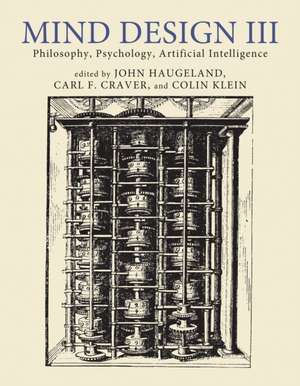Mind Design III
Autor Carl F. Craver, John Haugelanden Limba Engleză Paperback – 21 noi 2023
Preț: 468.44 lei
Preț vechi: 544.70 lei
-14% Nou
Puncte Express: 703
Preț estimativ în valută:
89.64€ • 97.67$ • 75.53£
89.64€ • 97.67$ • 75.53£
Carte disponibilă
Livrare economică 02-16 aprilie
Livrare express 18-22 martie pentru 53.19 lei
Preluare comenzi: 021 569.72.76
Specificații
ISBN-13: 9780262546577
ISBN-10: 0262546574
Pagini: 552
Ilustrații: 24 BLACK AND WHITE ILLUS.
Dimensiuni: 176 x 226 x 35 mm
Greutate: 1.02 kg
Editura: MIT Press Ltd
ISBN-10: 0262546574
Pagini: 552
Ilustrații: 24 BLACK AND WHITE ILLUS.
Dimensiuni: 176 x 226 x 35 mm
Greutate: 1.02 kg
Editura: MIT Press Ltd
Notă biografică
The late John Haugeland was the David B. and Clara E. Stern Professor Emeritus in Philosophy at the University of Chicago. He was chair of the Philosophy Department from 2004–2007 and was the editor of two editions of Mind Design: Philosophy, Psychology, and Artificial Intelligence.
Carl F. Craver is Professor of Philosophy and Philosophy-Neuroscience-Psychology at Washington University in St. Louis, author of Explaining the Brain: Mechanisms and the Mosaic Unity of Neuroscience, and coauthor of In Search of Mechanisms: Discoveries across the Life Sciences.
Colin Klein is Professor of Philosophy at the Australian National University and author of What the Body Commands: The Imperative Theory of Pain (MIT Press).
Carl F. Craver is Professor of Philosophy and Philosophy-Neuroscience-Psychology at Washington University in St. Louis, author of Explaining the Brain: Mechanisms and the Mosaic Unity of Neuroscience, and coauthor of In Search of Mechanisms: Discoveries across the Life Sciences.
Colin Klein is Professor of Philosophy at the Australian National University and author of What the Body Commands: The Imperative Theory of Pain (MIT Press).
Cuprins
1 Introduction to Mind Design III 1
Carl F. Craver and Colin Klein
PART I COMPUTERS, COMPUTING, AND COMPUTATION 5
2 What Is Mind Design? 11
John Haugeland
3 Computer Science as Empirical Inquiry: Symbols and Search 35
Allen Newell and Herbert A. Simon
4 Vision 59
David Marr
5 The Analog Alternative 71
Corey J. Maley
PART II WHAT IS INTELLIGENCE? 93
6 Computing Machinery and Intelligence 101
Alan M. Turing
7 On Our Best Behaviour 125
Hector J. Levesque
8 Rationality and Intelligence 139
Stuart J. Russell
9 Central Systems 159
Jerry A. Fodor
10 Why AI Is Harder than We Think 175
Melanie Mitchell
PART III INTENTIONALITY AND UNDERSTANDING 189
11 True Believers: The Intentional Strategy and Why It Works 197
Daniel C. Dennett
12 Minds, Brains, and Programs 217
John R. Searle
13 Escaping from the Chinese Room 235
Margaret Boden
14 Computation and Content 249
Frances Egan
PART IV MODELING THE WORLD 267
15 Transformational Abstraction in Deep Neural Networks 275
Cameron Buckner
16 The Evaluative Mind 295
Julia Haas
17 Whatever Next? Predictive Brains, Situated Agents, and the Future of Cognitive Science 315
Andy Clark
18 Theoretical Impediments to Machine Learning with Seven Sparks from the Causal Revolution 343
Judea Pearl
PART V CONTRIBUTIONS FROM COGNITIVE NEUROSCIENCE 353
19 The Architecture of Mind: A Connectionist Approach 361
David E. Rumelhart
20 The Computational Brain 385
Patricia Churchland and Terrence Sejnowski
21 The Mind Is Not (Just) a System of Modules Shaped (Just) by Natural Selection 409
Fiona Cowie and James Woodward
PART VI BODY AND WORLD 431
22 Mind Embodied and Embedded 439
John Haugeland
23 Intelligence without Representation 465
Rodney A. Brooks
24 What Does Biorobotics Offer Philosophy? A Tale of Two Navigation Systems 487
Barbara Webb
Acknowledgments 501
Bibliography 507
Carl F. Craver and Colin Klein
PART I COMPUTERS, COMPUTING, AND COMPUTATION 5
2 What Is Mind Design? 11
John Haugeland
3 Computer Science as Empirical Inquiry: Symbols and Search 35
Allen Newell and Herbert A. Simon
4 Vision 59
David Marr
5 The Analog Alternative 71
Corey J. Maley
PART II WHAT IS INTELLIGENCE? 93
6 Computing Machinery and Intelligence 101
Alan M. Turing
7 On Our Best Behaviour 125
Hector J. Levesque
8 Rationality and Intelligence 139
Stuart J. Russell
9 Central Systems 159
Jerry A. Fodor
10 Why AI Is Harder than We Think 175
Melanie Mitchell
PART III INTENTIONALITY AND UNDERSTANDING 189
11 True Believers: The Intentional Strategy and Why It Works 197
Daniel C. Dennett
12 Minds, Brains, and Programs 217
John R. Searle
13 Escaping from the Chinese Room 235
Margaret Boden
14 Computation and Content 249
Frances Egan
PART IV MODELING THE WORLD 267
15 Transformational Abstraction in Deep Neural Networks 275
Cameron Buckner
16 The Evaluative Mind 295
Julia Haas
17 Whatever Next? Predictive Brains, Situated Agents, and the Future of Cognitive Science 315
Andy Clark
18 Theoretical Impediments to Machine Learning with Seven Sparks from the Causal Revolution 343
Judea Pearl
PART V CONTRIBUTIONS FROM COGNITIVE NEUROSCIENCE 353
19 The Architecture of Mind: A Connectionist Approach 361
David E. Rumelhart
20 The Computational Brain 385
Patricia Churchland and Terrence Sejnowski
21 The Mind Is Not (Just) a System of Modules Shaped (Just) by Natural Selection 409
Fiona Cowie and James Woodward
PART VI BODY AND WORLD 431
22 Mind Embodied and Embedded 439
John Haugeland
23 Intelligence without Representation 465
Rodney A. Brooks
24 What Does Biorobotics Offer Philosophy? A Tale of Two Navigation Systems 487
Barbara Webb
Acknowledgments 501
Bibliography 507
